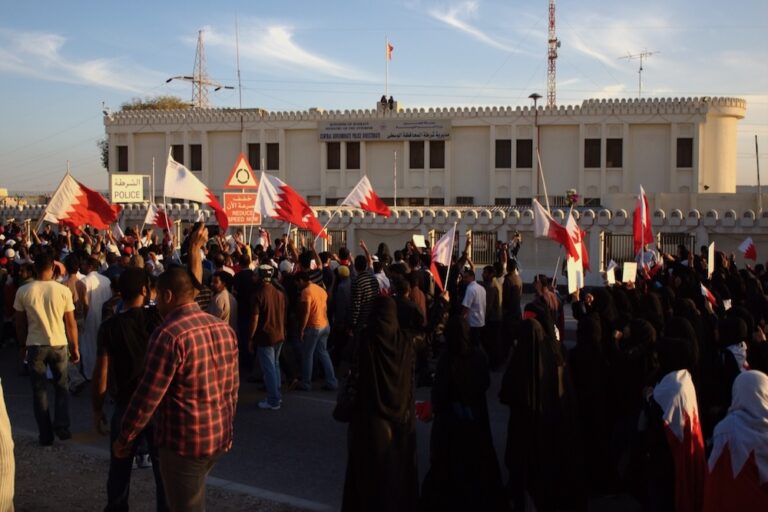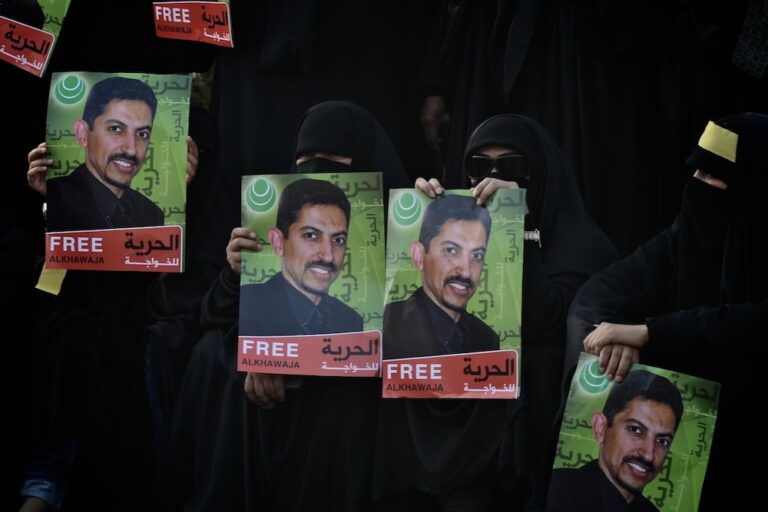ARTICLE 19 has called on the UN member states to urge the authorities to commit to preventing harassment of journalists and human rights defenders, stop controlling and censoring the media, increase internet freedom and end violations of the right to peaceful protest.
(ARTICLE 19/IFEX) – 18 May 2012 – ARTICLE 19 has called on the UN member states to urge Bahrain to commit to preventing harassment of journalists and human rights defenders, stop controlling and censoring the media, increase internet freedom and end violations of the right to peaceful protest.
The government of Bahrain will appear before the Human Rights Council on Monday, 21 May, for their quadrennial human rights review.
“After a year of harsh crackdown against those trying to inform, protest or call for change, the government of Bahrain must be held to account. The first Universal Periodic Review must be an opportunity to make real, measurable recommendations, such as can be found in our submission,” said Dr Agnes Callamard, ARTICLE 19 Executive Director.
ARTICLE 19 concerns, submitted in a shadow report to the Universal Periodic Review (UPR), include the unlawful arrests of peaceful protesters and human rights activists violence and attack on Journalists especially during the spread of the Arab Spring in the region, blocking of websites and international media content, as well the lack of independent media in the country.
ARTICLE 19 has condemned the arrests of human rights defenders, including the recent case of the arrest of human rights activist, Nabeel Rajab. Our submission focused on the extreme measures taken by the government of Bahrain to curb the freedom of activists to peacefully assemble and protest as well as the clampdown on journalists, photographers and human rights activists in the country. Rajab along with Abdulhadi al-Khawaja and several other protesters, are prisoners of conscience for protesting against the draconian laws in the country.
ARTICLE 19 urged the UN member states to call upon Bahrain to reform their legal system as well as ban the use of criminal defamation to arrest journalists unfairly. Al-Khawaja, was arrested in 2011 and was given a life sentence on false charges of ‘organising and managing terrorist organisations and making an attempt to overthrow the Government’ and was charged alongside 19 other activists in the civil court. Peaceful protesters and journalists have been sexually harassed, physically abused and their families have been threatened by the Government because of anti-government opinions and dissent.
“The UPR is a historical opportunity to look into these violations; we see these measures as casting a dark shadow upon the levels of free speech and human rights in the country,” added Dr Callamard.
The UPR must highlight the crackdown on bloggers and online activists as well those who have been silenced by pro-government supporters, while employees have been threatened for expressing their opinions on social networking forums. ARTICLE 19 condemns the blocking of websites and personal profile pages of several human rights groups, including the government’s decision to block Google Earth and Maps, to prevent dissent and protest in the country.
The national report submitted by Bahrain only portrays a partial and biased picture on the levels of freedom in the country, by highlighting the positive measures undertaken. The media in Bahrain is primarily State controlled, curbing the opinions of alternate media organisations and news outlets. The government has been actively blocking international current affairs programmes that are seen as ‘sensitive’ and ‘blasphemous’. There have been reports of interference in the working of foreign journalists. Other newspapers and journalists have been unable to share their opinions on democratic reform and are seen as ‘traitors’ and have conformed to self censorship.


